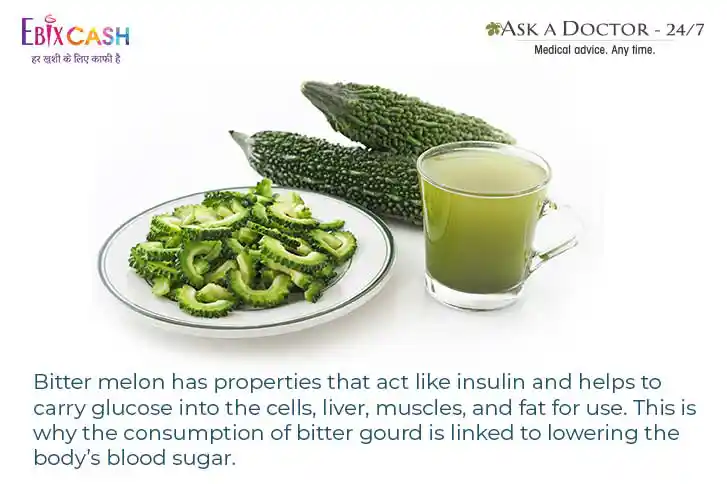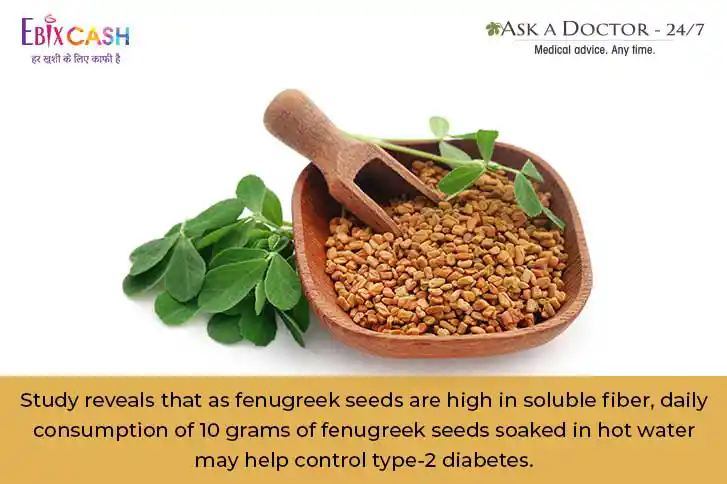5 Herbs That Help Manage Diabetes Naturally
Diabetes, known as a silent killer, is a chronic disease that mostly occurs due to genetic and sedentary lifestyle factors. Once diagnosed, patients with diabetes have to take anti-diabetic prescription medicines for their entire life. Although it is very difficult to stop taking the medication completely, there are some Ayurveda-based home remedies that can help lower your sugar levels naturally.
If you too are a diabetic, you must make sure to eat a diabetes-friendly diet. Try including these 5 herbs in your daily diet to find a real difference in your blood sugar numbers. Yes! These herbs are proven to keep your numbers in control. Try them today to observe the benefits.
1. Bitter Gourd (Karela)

Rich in plant insulin-polypeptide-P, bitter gourd, or karela can reduce hyperglycemia (increase in sugar levels). Bitter gourd also contains two very essential compounds called charatin and momordicin, which are the key properties that help lower one’s blood sugar levels.
How to use:
- Consume karela once a week either as a shallow fry or in a curry form, per your palate.
- Slice the bitter gourd and scrape away the flesh to remove the seeds. Add the sliced vegetable to a blender and run till it becomes juice.
- Drink one small glass of this juice on empty stomach every morning to get miraculous results in your blood glucose management.
2. Fenugreek (Methi)

Fenugreek is a commonly used herb in Indian kitchens with great benefits. It helps to control diabetes, improves glucose tolerance, lowers blood sugar levels, and stimulates the secretion of glucose-dependent insulin.
How to use:
- Soak 2 tablespoons of fenugreek seeds in water overnight and drink that water along with the seeds in the morning in an empty stomach daily to bring down your glucose level.
- Consume fenugreek seed powder with hot or cold water or milk daily.
3. Mango Leaves

Fresh mango leaves are an effective home remedy to manage diabetes.
How to use:
- Wash and sun-dry tender mango leaves and grind them to a powder. Consume this powder with water in the morning and night daily.
- Boil some fresh mango leaves in a glass of water and leave it to cool overnight. Drink the water in the morning on empty stomach.
4. Indian Gooseberry (Amla)

Indian gooseberry is one of the richest sources of vitamin C. It helps your pancreas produce optimum insulin so your blood glucose levels remain balanced.
How to use:
- Discard the seeds and grind 2-3 amlas into a fine paste, then squeeze out its juice through a strainer or a mulmul cloth. Mix this juice (approximately 2 tablespoons) in a cup of water and drink it every morning on empty stomach.
- Mix a cup of bitter gourd juice and 1 tbsp. of amla juice and drink it daily.
You can also consume raw amla every morning on an empty stomach.
5. Drumstick (Moringa Leaves)

The drumstick or moringa oleifera leaves are best known for their ability to maintain blood sugar levels and boost one's energy. The moringa leaves contain nutrients that increase insulin secretion in the body. The leaves are also rich in antioxidants and have anti-inflammatory properties.
How to use:
- Include 50 grams of fresh moringa leaves in any of your meal preparations such as dal or vegetables. It will not only add a flavor but also reduce the rise in blood sugar by 21%.
- You can also toss them in your salad or just steam them like spinach and have it as a side course.
With all stated above, please bear in mind that the list of herbs mentioned is not medical advice. These may or may not be suitable for every diabetic, owing to the individual body and digestion type. Therefore, consider including any of these herbs and veggies in your daily diet, only per the advice of your healthcare provider.
To know more about the role of herbs in diabetes management and whether or not to include these herbs in your diet, you can consult a Dietician online, right away.
Ask a Specialist
Recent Questions


